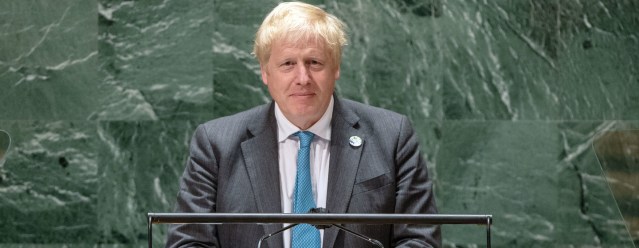
By Anders Lorenzen
With just weeks to go before COP26 kicks off, all eyes are on the British hosts and the Conservative government and its leader Boris Johnson.
A party and government which for years have not shown any interest in tackling the climate crisis with appropriate urgency are suddenly keen, but the party still has several MP’s airing climate-denying views. Even the president of COP26, Alok Sharma, has a record in parliament of being hostile to climate action.
And the Prime Minister, Boris Johnson, when Mayor of London (2008-2016) used his Telegraph column to air doubts about whether climate change was real. In addition, he frequently mocks climate activists as hippies. Questions can also be asked about some of his colleagues, such as Trade Secretary Anne-Marie Trevelyan, who have come under fire for airing climate-denying views in the past.
Kermit the Frog
Delivering his UN Assembly speech the UK prime minister used Kermit the Frog from the television series The Muppets as an analogy thus making the watching world feel either confused as to what he was on about or struggling to take him seriously, or both.
While the PM has been keen to showcase what the UK is doing at home to tackle the climate crisis positioning the country as a world leader, he is quick to point fingers at other countries who he believes are not doing enough; publicly saying the US should do a lot more. Whether the UK is the climate leader he claims is up for debate, but climate action for Johnson seems to be based only on two technologies, offshore wind and hydrogen, both in their early stages, while neglecting mature technologies such as onshore wind which is the cheapest new energy source which can be installed in the UK. This is directly related to the Conservative’s problem with onshore wind which many MP’s and voters are opposed to for the simple fact that wind turbines are seen as an eyesore.
Fossil fuel support
Furthermore, the UK is struggling with two fossil fuel-related crises at the moment. One is, the gas crisis caused by a sudden rise of gas prices due to wholesale rises in prices, and the second is the shortage of fuel at petrol stations due to a shortage of HGV drivers. Instead of reforming the system Johnson’s rhetoric is very much supporting and strengthening the fossil fuel infrastructure and reliance upon it.
It is reasonable to demand that a real climate leader should see these crises as an opportunity to look at how vulnerable our society is when relying 100% on fossil fuel infrastructure, and a climate leader could say these two crises show we need to accelerate the adoption of renewables and scale up the electric vehicle (EV) transition. In addition, the UK government is also supporting a new oil project in the North Sea and considering a new coal mine in Cumbria which could still go ahead. His stubborn support for fossil fuels does not look good in the run-up to COP26.
The role of diplomacy
Whether COP26 succeeds or not, in the end, comes down to diplomacy which, to say the least, is not the current UK government`s strongest force. John Kerry, a previous US foreign secretary hinted at this at a press conference when Johnson served as UK’s foreign secretary. Those two individuals will again have to work closely together in the run-up to COP26 with Kerry serving as President Biden’s Special Envoy for Climate Change.
When COP21 succeeded in Paris in 2015 it was because of the warm diplomatic relations between France and the rest of the world. As the UK is hosting COP26 as its first major global challenge after Brexit, they have not exactly created warm relations with the rest of the world. These conditions could not be more different than they were in Paris. And if there is not to be a sudden change of direction in diplomatic affairs this could make or break COP26.
Another problem is that Johnson historically only likes to deliver good news. And as an issue, the climate crisis is hardy a feel-good news story, with Johnson preferring largely to ignore the serious implications of climate change and cherry-pick the positivities in dealing with the challenge.
In his speech to the Conservative party conference, much green rhetoric was left out and there was not even space for his favourite subject; offshore wind.
This all prompts the question; do Johnson and his government actually believe in climate action or are they just pushing this now to get them over the COP26 finishing line?
The real test as to how seriously Johnson and his government take climate action is what action they take post COP26.
Categories: climate change, COP26, opinion, UK politics
I wonder if we could all do more to build environmental protection awareness, the people would change the way they act and reduce pollution, fossil fuel use and more?
LikeLike